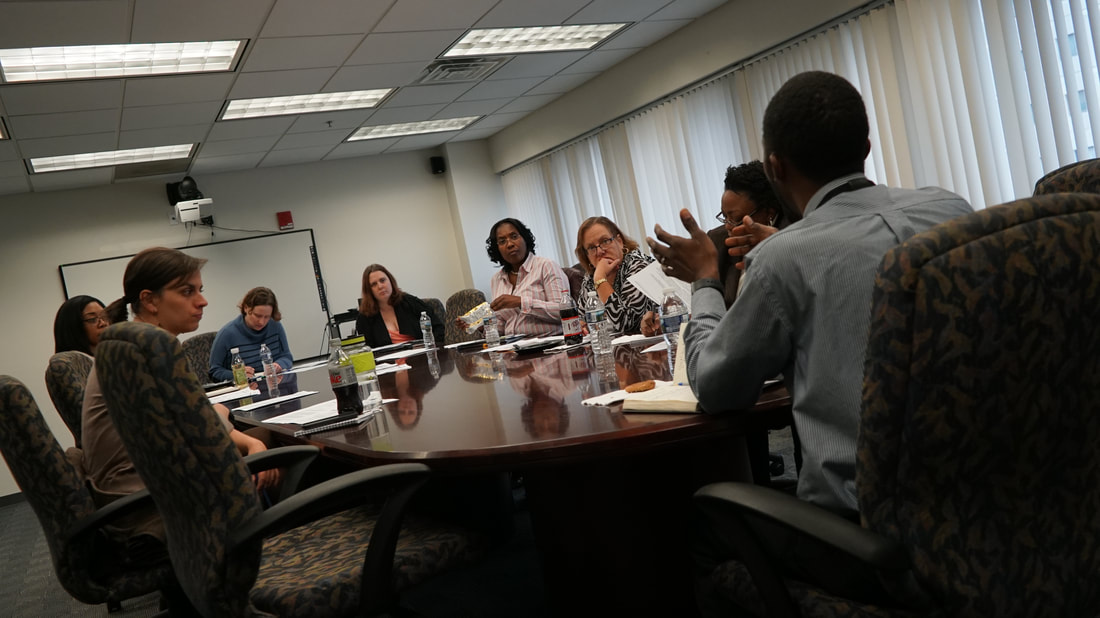|
As the last day of this 30-day challenge comes to a close, the last thing I want you to do is take a deep breath and take time to acknowledge the hard work you've been putting in. Of course it's not over. It keeps going. This 30 day challenge really is a lifelong pursuit of better outcomes that ultimately result in the elimination of poverty, crime, unemployment, disease, and overall unfulfilled potential. It never ends. But you have to take time for yourself. You will not solve every problem. You will not end world hunger, you will not win a Nobel peace prize (probably), but that doesn't mean you haven't had an impact.
When we don't track our progress it can seem like we haven't made any so we have to set goals, measure them and celebrate key milestones. I know most of us are "too busy" to keep count of the numbers but we need to, otherwise what do we have to show for it? You are valuable to this work. Your insights and experiences matter. Your relationships have grown stronger and your commitment is unquestionable. Don't let up on keeping track of your progress. You owe it to yourself to celebrate your success thus far and if you haven't reached your goals, that's ok. It's ok. Take time to celebrate small wins. As the saying goes: Be gentle with yourself you are a child of the universe no less than the trees and the stars in the noisy confusion of life keep peace in your soul. The only thing we can control in this life is our response to it. The problems will always be there so just be gentle with yourself. You have to be so you can keep going. If your community hasn't said it, I will - "Thanks for all you do." Sincerely, Adria Training, Training and more Training. That's the name of the game in 2018.
It's not enough to rely on old skills and years of experience. The industries we work in are constantly changing and new knowledge is being developed and new best practices are emerging. If we want cutting edge communities we have to have cutting edge know-how and that comes with training. When was the last time your department underwent professional development? What are skills your staff people could benefit from? What could help them in their work? What could help them in their personal relationships? You never know what people need unless you ask, so make 2018 the year you focus on your employees and what they need to be successful. It will pay dividends. What did you want to accomplish this year? How far did you get? Where did you fall short? Why? If you reached your goals what will you do to celebrate? If your department didn't have a strategic plan does it have plans to create one? Who will set the direction and priorities for the department? Who will be responsible to taking action?
It's important we take time to reflect. We often jump into the next project without learning from the previous one but we can no longer afford to do that. Resources are precious and if we can save them or use them more efficiently by learning from our mistakes, then we need to make the time to do so. Put your reflections to paper and vet them with your colleagues and stakeholders or better yet have them perform the same exercise and compare notes. Is everyone on the same page about lessons learned? Does your organization know how to move forward differently in 2018? If you are unsure of how to progress, that's ok, but employ the necessary people within your organization, or an outside consultant *hint hint* to figure it out. The new year is on our heels so let's make sure we can come out of the gate strong and hit the ground running! - Adria “7 Effective Ways to Make Others Feel Important" 1. Use their name. 2. Express sincere gratitude. 3. Do more listening than talking. 4. Talk more about them than about you. 5. Be authentically interested. 6. Be sincere in your praise. 7. Show you care.” ― Roy T. Bennett, The Light in the Heart When we make others feel important we lessen the impact of ourselves, grow increasingly humble and learn more than we thought we would. - Adria source: thebalance.com There's so much emphasis on what's not working and what could be better and including the right people and doing things correctly when sometimes all we really need to do is just say "thank you."
Take time to write a note, send an email, make a phone call and let someone know that you appreciate them and the efforts they've made on your behalf. As the 4th quarter comes to a close there’s still time to reflect on what went well, what could have gone better and what should never be attempted again (atleast without proper planning).
Speaking of which, here are 5 things community leaders can expect will always go wrong without proper planning: 1) Public meetings. It’s not enough to host a meeting. You don’t get points for scheduling a day and time. You have to give proper notice, make the agenda public in advance, hold meetings at convenient times for others (not your staff) and facilitate properly. If the people in attendance don’t know why they are there and what the follow up steps will be, you have failed. 2) Your risk reduction strategy. Every time I read the news another public official is being sued. Another department is under scrutiny. Another ex-employee is hauling out the city’s dirty laundry and receiving money that could have been spent on a collective good. In 2018 you must properly assess not just your regulatory requirements but also the HR and professional development standards needed to keep your staff sharp and compliant. Establishing a culture of integrity reduces your risk exposure. 3) Your reputation. If you had to rate your company’s public image on a scale of 1-5, what would you say? Would you bet your salary on being able to improve that rating by 20%? 10%? 5%? Who within your organization is responsible for managing reputation? Is there a strategy in place? If so, what is your role in it? Without a solid communications and PR plan your efforts become invisible, impacting your ability to leverage any success you might have. 4) Your economic development plan. Grant opportunities, public-private partnerships, supportive industries, millennials, etc are all at risk of leaving and never coming back if you fail to plan. What do these stakeholders need? What are the gaps? Who can fill them? If you could win a better neighborhood in the lottery there would be no need for economic or community development partners. Bring key stakeholders into the fold early on to ensure a comprehensive development plan that provides economic empowerment. 5) Your entire game plan. Without a plan your best ideas are subject to pure luck. If community development was basketball and your city is Jordan, Kobe or LeBron, then please keep on being great and let me know when your next training camp is. But for the rest of us hiding under the bleachers with 1 shoe because we couldn’t afford a ticket into the arena, there’s more work to do. You have to practice, you have to take risks and you have to trust others around you when strategizing your next move. Furthermore, community development, like basketball is a team sport and it simply does not work without a plan. What else might go wrong without proper planning? What are you doing to mitigate these potential risks? - Adria |
AuthorAdria is a community development consultant. She loves all things local and when she's not writing online you can find her enjoying the outdoors. Archives
January 2018
Categories |


 RSS Feed
RSS Feed
